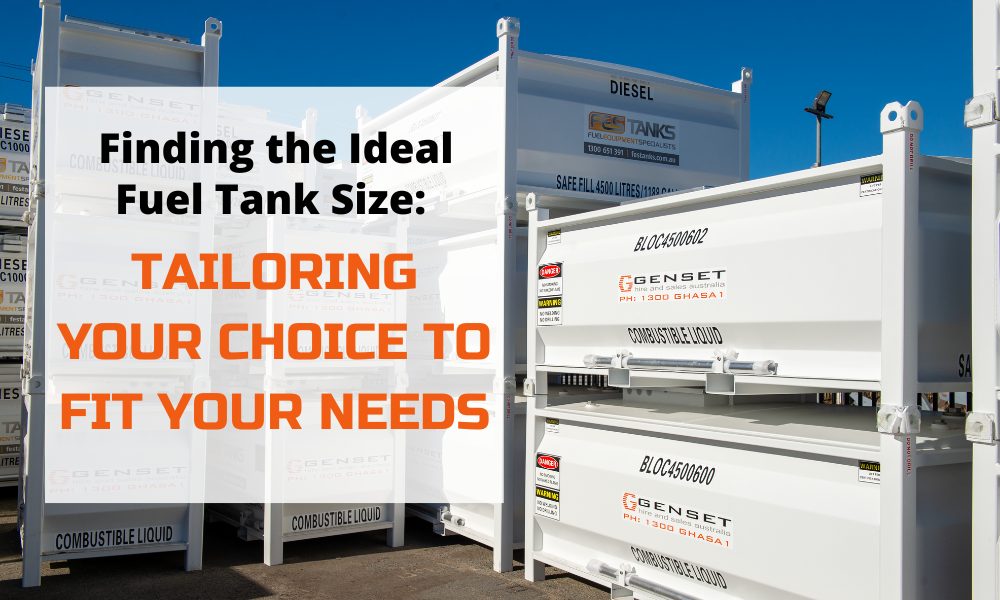When it comes to fuel storage, choosing the right fuel tank size is crucial for ensuring efficiency, cost-effectiveness, and safety. With so many factors to consider, determining the ideal fuel tank size for your needs can be a complex task.
At GHASA, we provide top-quality fuel storage solutions tailored to your needs. In this guide, we’ll assist you in choosing the ideal fuel tank size by considering key factors like fuel usage, space, compliance, and future needs. Our goal is to help you find the perfect tank that ensures efficiency, safety, and cost-effectiveness for your fuel storage.
Understanding Fuel Tank Capacity
Fuel tank capacity is a fundamental aspect of fuel storage. It refers to the total volume of fuel that a tank can hold. The capacity of a fuel tank can significantly impact operational efficiency, safety, and cost. For businesses and homeowners alike, understanding the importance of fuel tank size can help avoid common pitfalls and ensure that you choose a tank that meets your specific needs.
Factors to Consider When Choosing the Right Fuel Tank
When selecting the ideal fuel tank size, several key factors must be considered to ensure that your choice meets both current and future needs. Here are the critical aspects to evaluate:
1. Usage and Demand
The first step in choosing the right fuel tank size is assessing your fuel usage and demand. For industrial applications, such as construction or backup power generation, higher fuel consumption might require larger tanks. Conversely, smaller tanks might be sufficient for residential heating or small-scale operations.
Evaluate your typical fuel consumption rates and predict future needs based on seasonal variations or potential business growth. This will help you determine a tank size that accommodates your fuel requirements without unnecessary excess.
2. Space and Location
The available space and location for your fuel tank are critical factors in determining the ideal size. Assess the area where the tank will be installed, considering both the physical dimensions and accessibility for maintenance and refuelling.
Ensure that the chosen tank size fits comfortably within your allocated space while allowing for safe and convenient operation. Remember to adhere to local regulations regarding fuel tank installations to ensure compliance and safety.
3. Types of Fuel and Storage Solutions
Different types of fuel require different fuel storage tanks solutions. For instance, diesel fuel tanks might differ from those designed for petrol or oil. Additionally, some fuels may have specific requirements related to temperature control or safety features.
Consider the type of fuel you will be storing and choose a tank designed to handle that particular fuel type. This will ensure that your storage solution is both effective and compliant with safety standards.
4. Regulatory Compliance
Compliance with local regulations and safety standards is essential when selecting a fuel tank. Regulations often dictate the minimum and maximum sizes for fuel tanks based on their use and location.
Ensure that your chosen tank meets all legal requirements, including safety features such as spill containment and leak detection systems. Adhering to these regulations not only ensures safety but also helps avoid potential fines and operational disruptions.
5. Future Expansion
If you anticipate future growth or changes in fuel demand, consider opting for a tank size that allows for flexibility. A slightly larger tank might be a prudent choice if you foresee increased fuel consumption or plan to expand your operations.
Planning for future needs can save you the hassle and expense of upgrading or replacing your fuel tank sooner than expected.
Benefits of Choosing the Right Fuel Tank Size
Choosing the right fuel tank size is crucial for optimal fuel management and storage efficiency. By selecting a tank that matches your specific needs, you can enjoy a range of benefits, including improved operational efficiency, cost savings, enhanced safety, and greater convenience.
Here’s how finding the ideal fuel tank size can make a significant difference in your fuel storage solutions:
- Efficiency: A properly sized tank ensures that you have an adequate supply of fuel without excessive storage. This helps maintain operational efficiency and reduces the need for frequent refuelling.
- Cost Savings: Choosing a tank that matches your needs can help avoid over-investing in unnecessary storage capacity. Conversely, an undersized tank might lead to higher operational costs due to frequent refuelling or supply shortages.
- Safety: A correctly sized tank minimizes the risk of spills, leaks, and other safety hazards associated with fuel storage. Compliance with safety regulations ensures that your fuel storage solution operates smoothly and safely.
- Convenience: With the right tank size, you can streamline your fuel management processes, reducing the frequency of refuelling and simplifying inventory management.
Discover Your Ideal Fuel Tank with GHASA
Finding the ideal fuel tank size requires careful consideration of various factors, including fuel usage, space, regulatory compliance, and future needs. By evaluating these aspects, you can choose a fuel tank that best fits your requirements and ensures efficient, safe, and cost-effective fuel storage.
At GHASA, we offer a range of self bunded fuel storage tanks in Perth, Western Australia designed to meet diverse needs. Whether you’re looking for a small residential tank or a large industrial fuel storage solution, our team can help you find the perfect fit. Explore our options and contact us on (08) 9359 1988 to ensure you choose the right fuel tank size for your needs.


